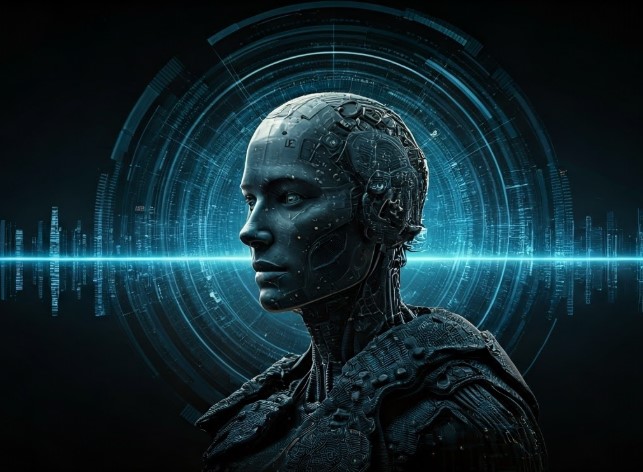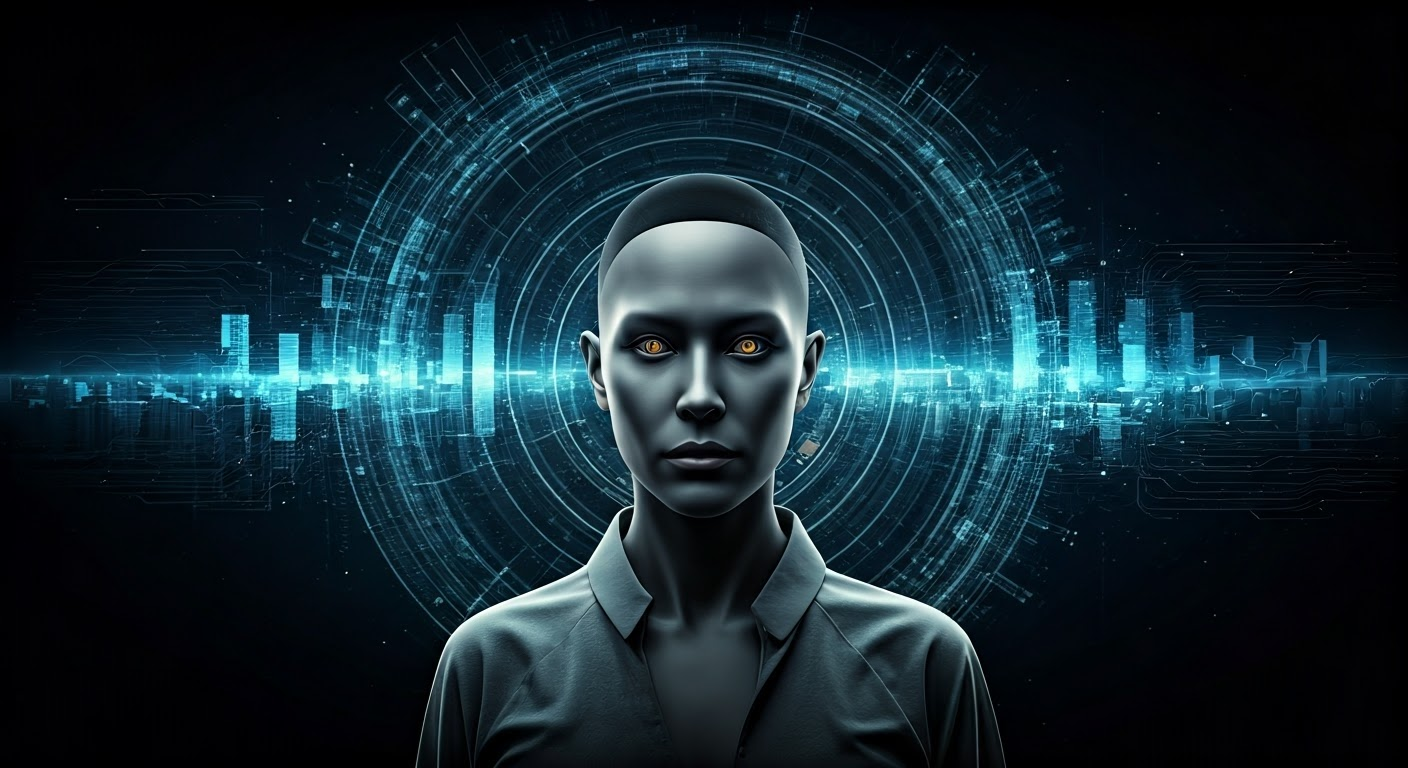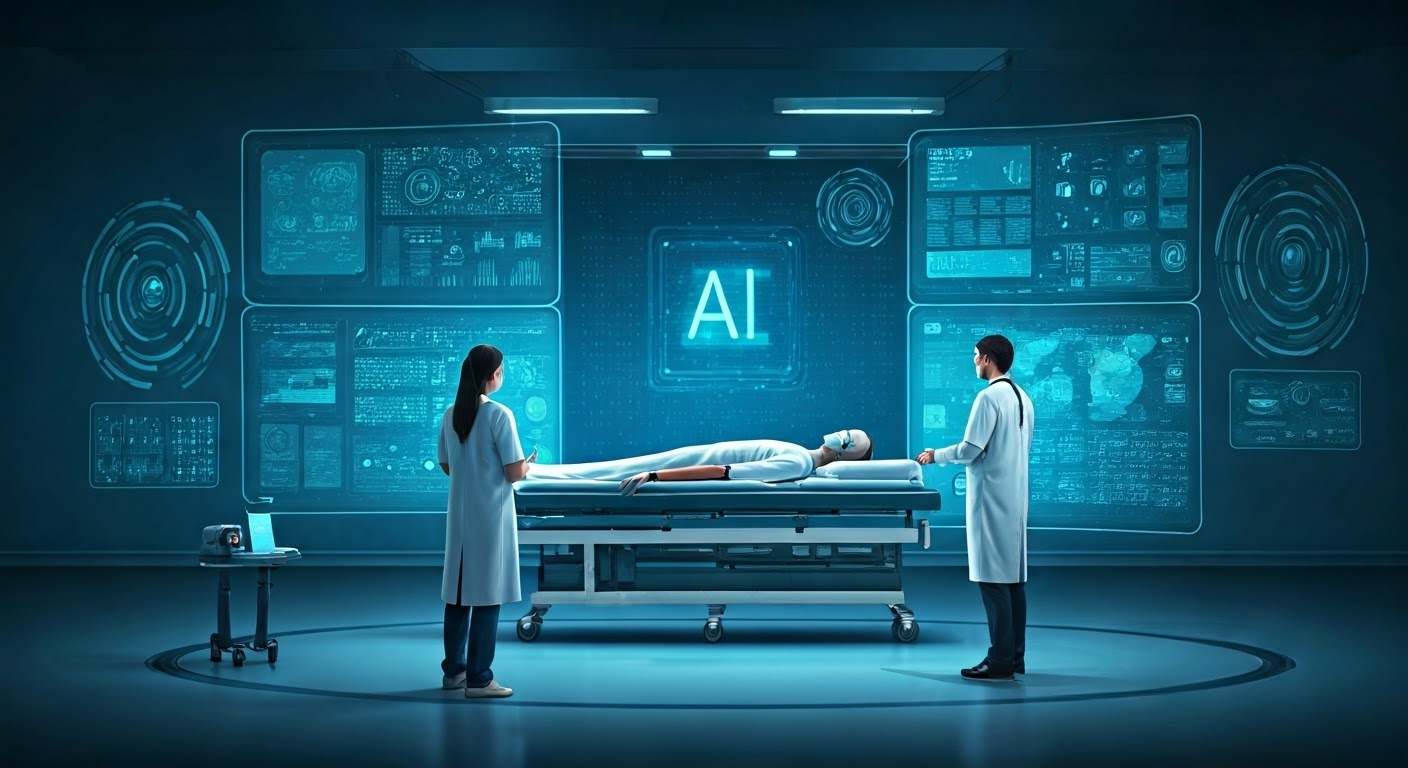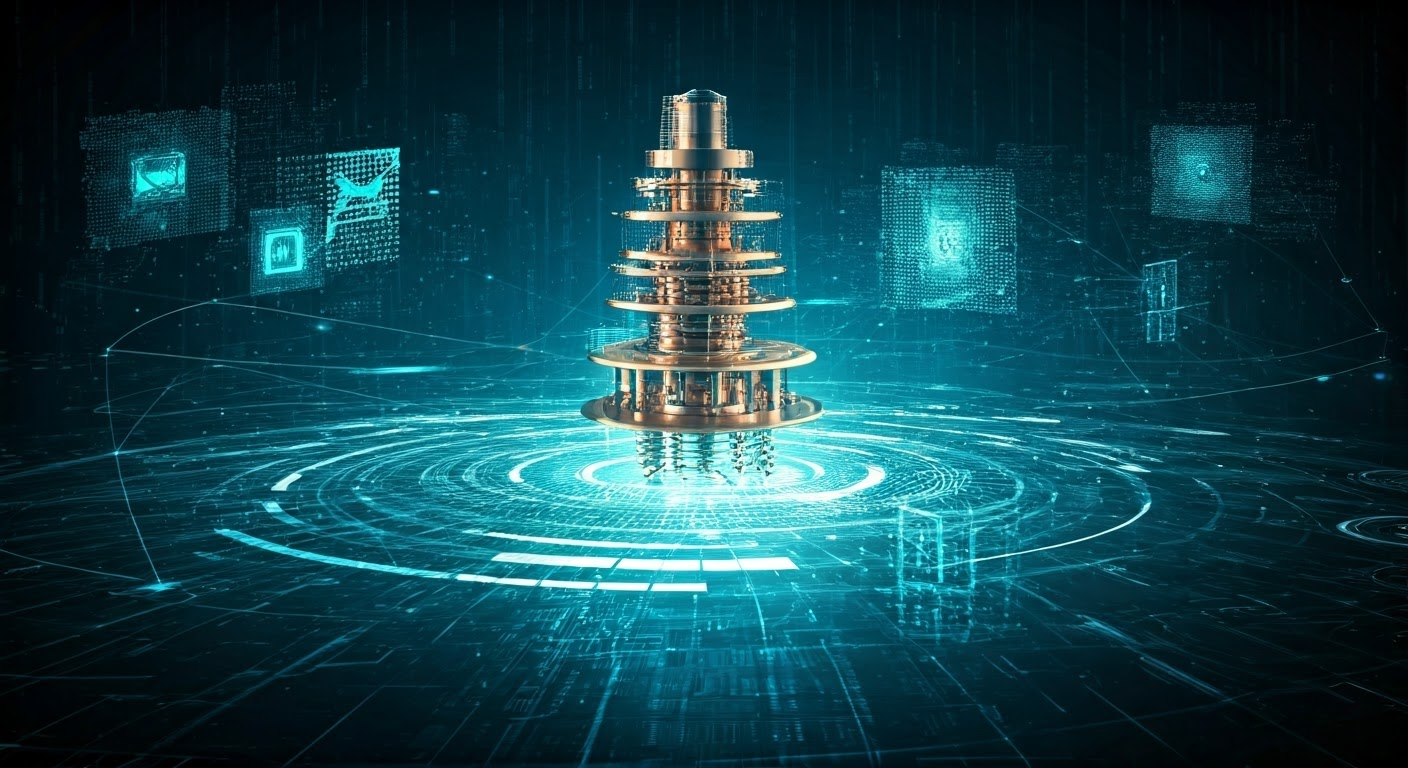
AI Predictions 2025: A Glimpse Into Tomorrow

Key Highlights
- Artificial intelligence (AI), particularly generative AI, is set to see widespread adoption in 2025, moving beyond pilot projects to full-scale enterprise deployments.
- We can expect to see the rise of AI agents, transforming workflows and potentially doubling the knowledge workforce, streamlining tasks in various sectors.
- Businesses will need to prioritize responsible AI practices to manage risks, ensure fairness, and maintain trust as AI becomes increasingly integrated into daily operations.
- The use of AI in product development will accelerate, fueled by advancements in multi-modal AI, leading to faster time-to-market and significant cost reductions.
- AI will be a key driver in advancing sustainability initiatives, optimizing energy consumption, and helping companies reach their environmental goals.
Introduction
The evolution of artificial intelligence (AI), including gen AI, is rapidly transforming industries worldwide. As we stand on the cusp of a new year, tech companies and businesses alike are eager to understand the potential of AI. 2025 is poised to be a pivotal year for AI adoption, with trends indicating a shift from experimental projects to full-blown integration across various sectors. Join us as we explore the exciting predictions and potential impact of AI in 2025.
AI Predictions 2025: Exploring the Future Today

The future of AI is brimming with possibilities. From revolutionizing patient care to redefining our cities, 2025 will be a year where AI's impact becomes increasingly tangible. We'll witness a surge in sophisticated AI systems, capable of not just automating tasks but also creating, innovating, and problem-solving alongside humans.
The transformative power of GenAI will be felt across diverse fields, impacting our daily lives in profound ways. Let's take a closer look at the specific areas where AI is expected to make a significant mark in 2025.
1. The Surge of AI in Healthcare: Revolutionizing Patient Care
AI is on track to revolutionize patient care. We can anticipate remarkable progress in areas like disease prediction and personalized treatment plans. AI systems will analyze vast medical datasets, identifying patterns and assisting healthcare professionals in making quicker and more informed diagnoses.
The potential of AI in drug discovery is also immense. By accelerating the research process and analyzing complex biological data, AI can contribute to the development of life-saving treatments at an unparalleled pace.
Moreover, AI-powered robotic surgery is gaining traction. With robots capable of performing intricate surgical procedures with greater precision, we can look forward to improved surgical outcomes, faster recovery times, and reduced risks for patients.
2. AI-Driven Cybersecurity: A New Era of Digital Protection
In an increasingly interconnected world, cybersecurity is more important than ever. AI-driven cybersecurity solutions will be crucial in safeguarding our digital assets from sophisticated cyber threats. As we generate and store more data, AI's ability to analyze vast amounts of information and identify anomalies in real time makes it an indispensable tool.
AI will also play a vital role in securing our data centers, the backbone of our digital world. AI-powered systems can detect and respond to threats in milliseconds, protecting critical infrastructure from cyberattacks.
The predictive capabilities of AI in cybersecurity are particularly promising. By anticipating threats before they occur, AI will empower organizations to take proactive measures, mitigating risks, and ensuring the safety of our data.
3. The Transformation of Retail Through AI Personalization
AI is set to revolutionize the retail landscape by enabling a new era of hyper-personalized shopping experiences. By leveraging sophisticated algorithms and analyzing customer data, AI technology will allow retailers to understand individual preferences, anticipate needs, and deliver tailored recommendations that resonate with each customer.
AI-powered chatbots and virtual assistants will further enhance customer service in the retail sector. These intelligent systems will provide instant support, answer questions, and guide customers through their shopping journeys, creating seamless and satisfying interactions that foster brand loyalty.
The ability of AI to personalize the retail experience extends beyond online interactions. Smart stores equipped with AI-powered sensors and cameras will analyze customer behavior, personalize product displays, and even offer tailored promotions in real-time.
4. AI and the Evolution of Autonomous Vehicles
Technology leaders in the automotive industry are making remarkable strides in the development of autonomous vehicles. AI systems are the brains behind self-driving cars, responsible for perception, decision-making, and navigation. As AI technology advances, we can anticipate safer and more reliable self-driving vehicles.
The potential impact of autonomous vehicles extends far beyond personal transportation. By the end of next year, AI-powered trucks and delivery systems are poised to revolutionize logistics and supply chain management, increasing efficiency, reducing costs, and creating new possibilities for businesses.
Moreover, autonomous vehicles have the potential to improve accessibility for individuals who are unable to drive due to physical limitations, further transforming lives and fostering greater independence.
5. The Impact of AI on Sustainable Energy Solutions
AI is emerging as a powerful tool in the quest for sustainable energy solutions. As we transition to a more sustainable future, AI technology will play a crucial role in optimizing energy consumption, supporting the clean energy transition, reducing waste, and mitigating the environmental impact of our energy systems.
One of the key areas where AI is making a difference is in smart grids. AI can analyze real-time data from energy grids to optimize energy distribution, ensuring efficient use of renewable energy sources like solar and wind power.
AI is also instrumental in developing and deploying smart energy storage solutions. By accurately predicting energy demand and optimizing charging and discharging cycles, AI can enhance the efficiency and reliability of renewable energy, paving the way for a cleaner energy future.
6. AI in Education: Personalized Learning Paths
The education sector is on the verge of a transformation, thanks to the power of AI. AI systems are opening new doors for personalized learning, tailoring educational experiences to meet the individual needs of each student. Personalized learning paths will become increasingly prevalent, ensuring that students can learn at their own pace.
AI-powered tutoring systems will provide students with personalized support and guidance, adapting to their learning styles and offering tailored feedback to help them excel. These intelligent systems will empower students to reach their full potential, regardless of their learning differences.
Furthermore, AI will play a crucial role in automating administrative tasks in the education sector, freeing up valuable time for teachers to focus on what they do best: inspiring and guiding their students.
7. The Rise of Intelligent Robotics in Manufacturing
The manufacturing industry is undergoing a significant transformation with the rise of intelligent robotics. AI systems are at the heart of this revolution, enabling robots to perform complex tasks with increased precision and adaptability. These intelligent robots are capable of learning from their experiences and improving their performance over time.
The integration of AI in manufacturing is boosting productivity, improving efficiency, and leading to the creation of smarter factories. AI-powered systems can optimize production lines, predict maintenance needs, and identify and correct defects in real time, reducing downtime and streamlining operations.
Moreover, the ability of robots to work collaboratively with humans in manufacturing settings is enhancing safety and efficiency. This collaboration between humans and machines is unlocking new possibilities in manufacturing, leading to the creation of higher-quality products at lower costs.
8. AI's Role in Advancing Agricultural Efficiency
AI technology is transforming the agricultural industry, driving greater efficiency and sustainability in food production. By analyzing data from sensors, drones, and satellites, AI can provide farmers with valuable insights into crop health, soil conditions, and weather patterns.
AI-powered systems enable precision agriculture, optimizing irrigation, fertilization, and pest control. By providing the right resources at the right time, AI minimizes waste, reduces environmental impact, and enhances crop yields.
Furthermore, AI is being used to develop innovative solutions for food security. By analyzing market trends and predicting food shortages, AI can help to optimize food distribution networks and minimize food waste, ensuring that everyone has access to nutritious and affordable food.
9. The Expansion of AI in Financial Services for Tailored Banking
The financial services industry is being reshaped by the expanding capabilities of AI, particularly among AI-native startups. In 2025, we can expect to see a surge in the adoption of AI systems for personalized banking experiences. AI will enable financial institutions to understand customer needs and preferences more deeply, leading to tailored financial advice, customized investment strategies, and personalized product recommendations.
AI-powered chatbots and virtual assistants will transform customer interactions in banking. These intelligent systems will provide 24/7 support, answer questions, guide customers through complex financial processes, and even detect and prevent fraud, making banking easier, faster, and more secure.
As AI continues to evolve, we can anticipate the development of even more sophisticated financial services, such as AI-powered robo-advisors that provide personalized investment advice and algorithmic trading systems that make investment decisions based on real-time market data worth millions of dollars.
10. AI-Powered Smart Cities: Enhancing Urban Living
The concept of smart cities is rapidly becoming a reality, thanks to the transformative power of AI. By leveraging vast amounts of data from sensors, cameras, and other sources, AI technology is enabling cities to optimize infrastructure, improve public services, and enhance the overall quality of urban living.
AI will play a crucial role in areas like traffic management, optimizing traffic flow, reducing congestion, and improving transportation efficiency. AI-powered systems will also enhance public safety, making our urban environments safer and more secure.
Furthermore, AI can contribute to a more sustainable future for our cities by optimizing energy consumption in buildings, managing waste more efficiently, and monitoring environmental conditions to improve air quality.
The Technical Frontier: Innovations Driving AI Forward

The remarkable advancements in AI we are witnessing today are driven by continuous innovation in underlying technologies. Breakthroughs in quantum computing, natural language processing, and edge computing are pushing the boundaries of AI's capabilities, enabling us to develop even more sophisticated and powerful systems that once seemed like science fiction.
The convergence of these cutting-edge technologies is paving the way for a new era of AI, one where machines can understand and interact with the world around them in ways that were previously unimaginable. Let's explore some of the key technical innovations driving AI forward.
11. Breakthroughs in Quantum Computing and AI
Quantum computing represents a paradigm shift in computing technology. It harnesses the principles of quantum mechanics to perform calculations at speeds exponentially faster than traditional computers. While still in its early stages of development, research labs around the world are making significant strides in quantum computing, and its potential impact on AI is immense.
The unparalleled processing power of quantum computers promises to unlock new frontiers in AI research and development. AI algorithms, including those developed by OpenAI, that are currently limited by computational constraints could be significantly accelerated, leading to breakthroughs in areas like drug discovery, materials science, and financial modeling.
Furthermore, quantum computing could lead to the development of entirely new AI algorithms and architectures, further expanding the capabilities of AI and enabling us to tackle even more complex challenges.
12. Advances in Natural Language Processing for Deeper Interactions
Natural language processing (NLP) is a branch of AI that focuses on enabling computers to understand, interpret, and generate human language. Recent advancements in NLP, particularly the development of large language models, have led to significant improvements in language-based tasks like translation, summarization, and question answering.
These advancements are paving the way for more natural and intuitive interactions between humans and machines. AI agents, including models like ChatGPT, are becoming increasingly adept at understanding and responding to human language, enabling more sophisticated and engaging conversational AI experiences.
Furthermore, NLP is playing a vital role in extracting valuable insights from unstructured data, such as text and speech, allowing us to unlock knowledge and intelligence from sources that were previously difficult to analyze.
13. The Growth of Edge Computing in AI Deployment
Edge computing is an emerging computing paradigm that brings computation and data storage closer to the devices and users that need them, reducing latency and enabling real-time processing. This is particularly relevant for LLMs and AI systems, as many AI applications require rapid decision-making and response times that are difficult to achieve with traditional centralized data centers.
By deploying AI systems at the network edge, closer to where data is generated, we can significantly enhance the speed, efficiency, and responsiveness of AI applications, keeping large enterprises top of mind. For instance, in autonomous vehicles, edge computing allows for real-time processing of sensor data, enabling faster and safer decision-making.
Furthermore, edge computing reduces the reliance on centralized cloud infrastructure, enhancing data privacy and security by keeping sensitive data closer to the source.
14. Ethical AI: Developing Fair and Responsible Algorithms
Ethical AI is crucial for developing fair and responsible algorithms. Ensuring transparency and accountability in AI systems is vital. Companies need to prioritize ethical considerations in AI development to avoid biases and discrimination. Integrating human oversight and AI risk assessment are key rules for ethical AI implementation. Innovation in AI technology must align with ethical standards to build trust with users and society. Collaboration between tech companies, research labs, and policymakers is essential in setting guidelines for ethical AI practices. Embracing ethical AI is imperative for a sustainable and trustworthy future.
Real-World Applications: AI’s Transformative Power
The true power of AI lies not just in its technological advancements but in its ability to address real-world challenges and improve human lives. AI is being applied to a wide range of practical use cases, from revolutionizing disaster response to enhancing creative industries and optimizing global supply chains.
As AI technology continues to evolve, its transformative power will become even more evident in the years to come. Let's explore some of the inspiring ways AI is being used to make a positive impact.
15. AI in Disaster Response: Saving Lives with Predictive Analytics
AI is becoming increasingly instrumental in disaster response efforts, where rapid and effective action can save countless lives. AI systems, powered by predictive analytics, analyze historical data, weather patterns, and other relevant information to predict natural disasters, such as hurricanes, earthquakes, and wildfires, with greater accuracy.
Early warning systems, driven by AI, allow authorities to issue timely evacuations and allocate resources effectively, minimizing the impact of disasters on human lives and property. AI can also assist in damage assessment, using aerial imagery and satellite data to identify affected areas and guide rescue efforts.
Furthermore, AI-powered communication systems are facilitating coordination among first responders and aid organizations during emergencies, ensuring that help reaches those in need as quickly as possible.
16. Enhancing Creative Industries with AI Tools
The creative industries, from music and art to film and design, are experiencing a wave of innovation, thanks to the emergence of powerful AI tools like Microsoft. Generative AI, in particular, is capturing the imagination of artists and creators, enabling them to explore new frontiers of creative expression.
AI tools are empowering artists with new capabilities, from generating realistic images and composing original music to creating immersive virtual worlds and even writing compelling narratives. These tools are not meant to replace human creativity but rather to augment and expand it, providing artists with new avenues for exploration and innovation.
The collaboration between AI and human creativity is resulting in novel and thought-provoking works of art, music, and literature. It's also opening new possibilities for personalized entertainment experiences, with AI systems generating content tailored to individual tastes.
17. AI in Logistics: Streamlining Supply Chains
The global supply chain is a complex ecosystem that relies on efficient logistics and transportation networks. AI technology is playing an increasingly critical role in optimizing these networks, improving efficiency, reducing costs, and ensuring the timely delivery of goods.
AI-powered systems are transforming logistics by optimizing routes, predicting delivery times with greater accuracy, and proactively identifying and mitigating potential disruptions in the supply chain. AI also enables more efficient warehouse management, optimizing storage space, and automating inventory control.
As AI continues to permeate the world of logistics, we can anticipate even smoother and more resilient supply chains, capazble of adapting to changing circumstances and ensuring that goods flow seamlessly from manufacturers to consumers.
KeywordSearch: SuperCharge Your Ad Audiences with AI
KeywordSearch has an AI Audience builder that helps you create the best ad audiences for YouTube & Google ads in seconds. In a just a few clicks, our AI algorithm analyzes your business, audience data, uncovers hidden patterns, and identifies the most relevant and high-performing audiences for your Google & YouTube Ad campaigns.
You can also use KeywordSearch to Discover the Best Keywords to rank your YouTube Videos, Websites with SEO & Even Discover Keywords for Google & YouTube Ads.
If you’re looking to SuperCharge Your Ad Audiences with AI - Sign up for KeywordSearch.com for a 5 Day Free Trial Today!
Conclusion
The future of AI is promising, with advancements in healthcare, cybersecurity, retail, autonomous vehicles, sustainable energy, education, robotics, agriculture, finance, smart cities, and software development. Innovations like quantum computing, natural language processing, edge computing, and ethical AI are driving this transformation. Real-world applications range from disaster response to enhancing creativity and logistics. As AI continues to evolve, businesses must embrace these changes and prepare for the possibilities AI offers. By understanding the potential risks and benefits, we can harness AI's power to create a better tomorrow. Stay informed and be part of the AI revolution shaping our world.
Frequently Asked Questions
What are the potential risks of AI in 2025?
Ethical AI risks include job displacement, biased algorithms, data privacy breaches, and the misuse of AI for malicious purposes. Strong governance, human oversight, robust cybersecurity measures, and a focus on fairness are crucial for mitigating these AI risks. It's also important to adhere to the full list of posting rules to maintain ethical standards in AI discussions.
How can businesses prepare for AI advancements?
Business owners should incorporate AI advancements into their corporate strategy, focusing on identifying high-impact AI use cases, investing in AI talent and infrastructure, and ensuring responsible AI development. They need to demonstrate AI's assurance of ROI for their specific business and upskill their workforce.
Will AI create or eliminate jobs by 2025?
The impact of AI on jobs will be a blend of both job creation and displacement. A new administration may influence how technology leaders predict AI will automate repetitive tasks, leading to job shifts rather than total elimination. Early adopters will likely see a higher demand for AI-related roles.
How will AI impact everyday life in 2025?
AI applications will seamlessly integrate into our everyday life. From personalized experiences on the internet and smartphones to AI-powered customer service, AI assistants will streamline tasks, provide personalized recommendations, and enhance convenience, even more than it does today.
Can AI contribute to solving climate change?
Yes, AI technology offers solutions for climate change. AI can optimize energy consumption patterns, accelerate the development of sustainable energy, improve resource management, and enhance our understanding of climate change through data analysis.
